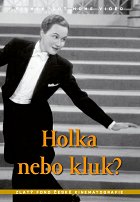Directed by:
Vladimír SlavínskýScreenplay:
Vladimír SlavínskýCinematography:
Jan RothComposer:
Josef StelibskýCast:
Adina Mandlová, Marie Blažková, Theodor Pištěk, Václav Trégl, Růžena Šlemrová, Raoul Schránil, Nina Strnadová-Jarková, Bedřich Veverka, Ferenc Futurista (more)Plots(1)
Three unsuccessful marriages have made of estate-owner Orlický an enemy of women. He pressures his employees, even nephew Ríša who lives with him, into bachelorhood. Later, when he finds out that Ríša has met a young girl, Orlický thinks about a more suitable heir. The estate owner sees in the newspaper a photograph of Ada Bártů, dancer and singer. He thinks that this could be the son of his sister, who at one time married against their parents' wishes. Consequently he sends his secretary, Kropáček, to Prague. He ascertains that this actually does concern the offspring of Orlický's sister and that this offspring even has a business school, but unfortunately it is a girl. Ada only presents herself in men's clothing in the theatre. Ada makes Kropáček take her dressed in men's clothing with him. The uncle believes that she is a boy, but Ada soon has some difficulties with her disguise as she has fallen in love with Ríša. The deception is soon seen through and Ríša returns Ada's feelings. The uncle, who has grown fond of Ada, eventually reconciles with everyone, especially when the young couple promise him that their child will call him grandfather. (official distributor synopsis)
(more)Reviews (1)
A classic cross-dressing comedy in the tradition of the cross-dressers that were so popular in the 1930s. While in Germany this sub-genre was defined by the famous musical comedy Viktor and Viktoria, the Czechs worked with Lída Baarová, Hana Vítová, and last but not least Vera Ferbasová, and Anny Ondra, of course, also mastered this style on the edge between German and Czech cinema. In the version with Adina Mandlová we get a portion of the best from the home workshop of Vladimír Slavínský. The casting of even the smallest roles is great, along with witty dialogues, exaggeration, trends of the period, and a modern view of the time. Girl or Boy? also artistically deals with such phenomena as the yuppie fame of the artists of the Grand Operetta, the popularity of boxing in rural areas, and the contrasting view of the role of young women in society. In this, the naive Fanča Foltová (preparing for the role of a mother of at least 4 children) is a great contrast to the modern Mandlová (with a love of theater, yet with a practical school).
()

